Overview
The article presents an in-depth exploration of best practices for healthcare and digital transformation, underscoring the critical need for integrating technology to elevate patient care and enhance operational efficiency. It outlines essential strategies such as:
- Establishing a clear vision
- Fostering a culture of innovation
- Investing in training
- Leveraging data analytics
- Prioritizing cybersecurity
These elements are vital for navigating the complexities of modern healthcare demands and achieving successful transformation. How can your organization effectively implement these strategies? By embracing these practices, healthcare providers can not only meet current challenges but also position themselves for future success.
Introduction
In the rapidly evolving landscape of healthcare, digital transformation stands as a fundamental shift reshaping how care is delivered and managed. Technologies such as electronic health records, telemedicine, and artificial intelligence are not just trends; they are catalysts for reimagining patient engagement and operational efficiency.
As the industry confronts an explosion of data and shifting patient expectations, grasping the drivers, challenges, and strategies for successful digital transformation becomes essential. This article delves into the critical aspects of digital transformation in healthcare, exploring how organizations can leverage technology to enhance service delivery, improve patient outcomes, and navigate the complexities of this dynamic environment.
Are you ready to embrace this transformative journey?
Understanding Digital Transformation in Healthcare
The technological transformation in healthcare and digital transformation signifies a comprehensive integration of electronic innovations across all operational facets, fundamentally reshaping service delivery and client interaction. This evolution encompasses a spectrum of technologies, including electronic health records (EHRs), telemedicine, and artificial intelligence (AI), all of which collectively enhance patient care, streamline operations, and optimize data management. As medical organizations navigate the complexities of contemporary demands, the significance of healthcare and digital transformation becomes increasingly essential for achieving success in this dynamic landscape.
Currently, the medical field is experiencing a technological revolution that is pivotal for healthcare and digital transformation. This shift is driven by an unprecedented surge in data generated from various innovations such as smartphones, cloud computing, AI, and wearables. This data is vital for transitioning the focus from treatment to prevention, with medical data projected to constitute approximately 30% of the world’s data volume by 2025, reflecting a compound annual growth rate of 36%. Such statistics underscore the urgency for healthcare and digital transformation, compelling medical providers to adapt their operations to effectively harness this wealth of information.
Successful integration of digital technologies is exemplified by numerous case studies within healthcare and digital transformation. For instance, organizations that have adopted telemedicine and AI-driven analytics as part of their transformation initiatives have reported significant enhancements in patient outcomes and operational efficiency. These advancements not only elevate the quality of care but also reduce costs, allowing providers to allocate resources more effectively.
Avato’s hybrid integration platform, featuring real-time data synchronization, robust security protocols, and seamless connectivity, plays a crucial role in this context. It ensures 24/7 uptime for critical integrations, enabling businesses to adapt to changing demands while maintaining a competitive edge. This commitment to streamlining complex systems is essential for enhancing business value in healthcare and digital transformation.
As we approach 2025, the impact of healthcare and digital transformation on medical operations will continue to evolve. Key trends include the growing reliance on wearable devices, with companies like Apple leading the market in this area. Such advancements are expected to play a vital role in individual monitoring and engagement, further advancing the transformation agenda.
In conclusion, the integration of technological innovations in healthcare and digital transformation is not merely a trend but a profound shift that is redefining the industry. By understanding and implementing effective transformation strategies, medical institutions can enhance their operational capabilities, improve patient care, and sustain a competitive advantage in an ever-evolving environment. As noted by Gustavo Estrada, ‘Avato simplifies complex projects and delivers results within desired time frames and budget constraints,’ highlighting the importance of reliable integration solutions in achieving these objectives.
Additionally, insights from our white paper on successful healthcare and digital transformation offer further strategies for medical organizations aiming to navigate this evolving landscape.
Key Drivers of Digital Transformation in Healthcare
Several pivotal factors are driving healthcare and digital transformation in the medical sector. Foremost among these are technological advancements, particularly in artificial intelligence (AI), machine learning, and big data analytics. These innovations are crucial for healthcare and digital transformation, enabling healthcare professionals to offer more personalized and efficient care, which in turn improves outcomes for individuals and operational effectiveness.
For instance, predictive analytics is increasingly utilized to anticipate healthcare needs, allowing hospitals to forecast admission rates during peak seasons, such as flu outbreaks. This proactive approach not only improves resource management but also ensures that care delivery is timely and effective. A case study titled ‘Predictive Analytics for Proactive Care’ illustrates this, showing how hospitals can leverage historical and real-time data to manage resources effectively during high-demand periods.
Another significant driver is the evolving expectations of patients, who now demand more accessible and transparent services. This change, shaped by the consumer-focused nature of medical services, urges entities to offer smooth interactions similar to those seen in retail and banking industries. Individuals anticipate their medical experiences to be as simple and user-friendly as their interactions with other sectors. Furthermore, regulatory demands and the need for improved operational efficiencies additionally encourage health systems to adopt electronic solutions as part of healthcare and digital transformation.
As the landscape evolves, entities that fail to adapt risk falling behind in a competitive environment where agility and responsiveness are paramount. Significantly, 70% of CEOs anticipate skill shortages as a key challenge in the near future, highlighting the urgency for technological advancement in the medical sector. By 2025, the medical sector is expected to experience significant progress, including the emergence of virtual hospitals and tailored medicine, underscoring the need for change.
The four primary aspects of technological transformation—Business Process Change, Technology Change, Structural Change, and Customer Experience Change—are essential for medical entities to contemplate as they traverse this journey. Avato’s hybrid integration platform, known for its features such as seamless data integration, real-time analytics, and user-friendly interfaces, plays a vital role in this context, simplifying the integration of disparate systems and enhancing business value creation. Avato was founded by a group of enterprise architects dedicated to solving complex integration challenges, which reflects the company’s commitment to delivering results for its clients.
In summary, the convergence of technological advancements, changing patient expectations, and regulatory demands generates a compelling drive for medical entities to commence their journeys in healthcare and digital transformation. Those who welcome these changes will not only enhance their service delivery but also establish themselves as leaders in an ever-evolving technological future. As Gustavo Estrada noted, ‘Avato has simplified complex projects and delivered results within desired time frames and budget constraints,’ highlighting the importance of efficient integration in achieving these goals.
Challenges in Implementing Digital Transformation
Organizations face numerous challenges in achieving success during the implementation of healthcare and digital transformation in the medical field. A primary obstacle is the integration of legacy systems, which often suffer from interoperability issues that impede the seamless exchange of information. In fact, over 70% of healthcare organizations report difficulties related to legacy system integration, underscoring the urgency of addressing this issue.
Data security and privacy concerns are critical as healthcare entities must adhere to stringent regulations such as HIPAA. The potential for data breaches jeopardizes patient trust and can lead to substantial financial penalties. Furthermore, resistance to change among staff can significantly hinder progress; employees may be reluctant to embrace new technologies or workflows, fearing disruptions to their established routines.
To mitigate these challenges, investing in comprehensive training programs is essential to ensure staff are comfortable with new platforms like Avato’s hybrid integration platform. Implementing effective change management strategies can smooth the transition and foster a culture of innovation within the organization.
The financial burden associated with implementing advanced technologies complicates the landscape further. High expenses can discourage organizations from pursuing thorough technological strategies, leaving them vulnerable in an increasingly competitive environment. Industry specialists highlight that enhancing workflows via technical support could result in overall time savings of 15 to 30 percent during a 12-hour shift, demonstrating the potential advantages of addressing these obstacles.
To successfully confront these challenges, a hybrid model that merges online sessions with face-to-face visits has been proposed, particularly in health interventions. This approach not only addresses the shortcomings of electronic health technologies but also enhances the efficiency of care delivery. The difficulties of replicating hands-on medical approaches remotely emphasize the necessity of such a model.
Additionally, it is crucial to acknowledge that 75 percent of executives indicate they are not yet capable of fulfilling their transformation ambitions, highlighting a broader context of challenges faced by companies in reaching their transformation objectives. By recognizing and actively tackling these challenges, medical entities can pave the way for successful technological transformation, ultimately enhancing patient outcomes and operational effectiveness. Avato’s hybrid integration platform is pivotal in this process, enabling entities to effectively mobilize stakeholders and future-proof their systems, ensuring seamless integration of new technologies with existing assets.
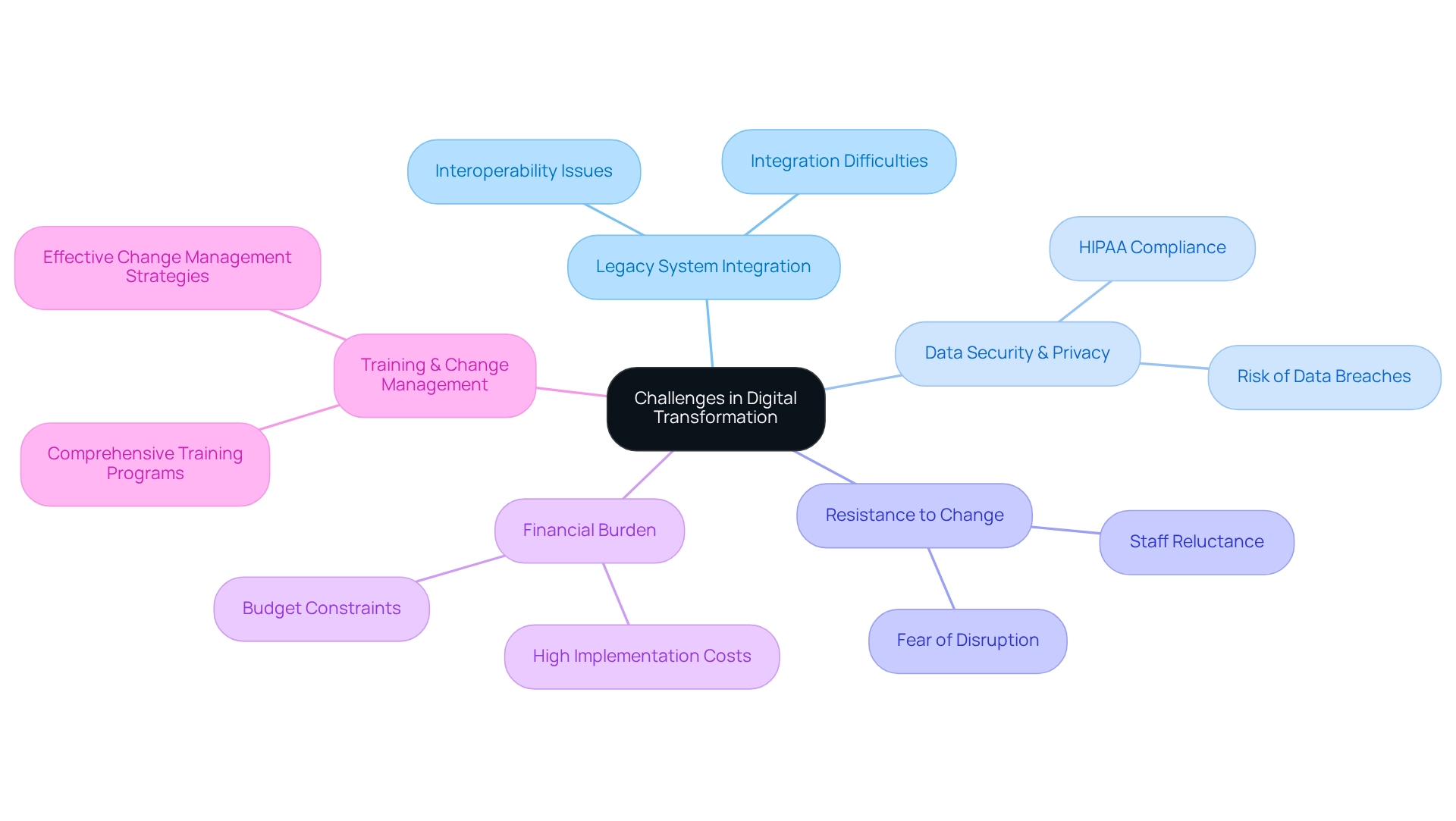
Proven Strategies for Successful Digital Transformation
Effective transformation in the healthcare and digital transformation field relies on several established strategies that entities must embrace. First and foremost, establishing a clear vision and roadmap is vital. This foundational step ensures that all stakeholders are aligned and working towards common goals, which is essential for effective implementation. A well-defined vision not only guides the transformation process but also fosters a sense of purpose among staff.
Fostering a culture of innovation and continuous improvement is equally important. Encouraging employees to embrace new technologies and processes can lead to significant advancements in service delivery. As healthcare and digital transformation entities encounter growing demands from individuals and stakeholders to boost technology adoption, those open to change can access various enhancements through data-driven optimizations and personalization.
The progress in electronic medicine, especially through the application of AI and VR, demonstrates how technology can personalize care and enhance treatment results, as observed in uses for PTSD and pain management.
Investing in training and development is essential for preparing staff with the abilities required to utilize electronic tools effectively. This investment not only boosts employee confidence but also ensures that the entity can fully utilize its digital capabilities. Indeed, entities that emphasize training frequently observe a significant enhancement in operational efficiencies and care results.
Utilizing data analytics is another vital approach. By harnessing the power of data, medical organizations can gain valuable insights that inform decision-making and improve care for individuals. This method facilitates more tailored treatment strategies and enhanced operational processes, ultimately resulting in better outcomes for individuals.
The significance of diversity in medical data is emphasized by the statistic that, as of 2018, 78% of participants in genome-wide association studies were European, highlighting the need for broader representation in data analytics. Moreover, ensuring patients have access and control over their health data is essential for exploring innovative treatment options.
Prioritizing cybersecurity measures is essential to protect sensitive patient information and maintain trust. As technological change advances, the risk of cyber threats rises, making it essential for medical entities to implement strong security protocols.
As Gustavo Estrada pointed out, Avato streamlines intricate projects and provides outcomes within expected time frames and budget limits, illustrating the potential for successful technological change. Furthermore, entities should ensure their integration solutions provide strong analytics features to consistently assess performance and enhance operations. By embracing these strategies, medical organizations can greatly improve their technological capabilities through healthcare and digital transformation, ensuring they stay competitive and responsive to the changing needs of patients and the medical environment.
Moreover, it is essential to acknowledge the limitations in scope and the necessity for continuous updates in the swiftly changing health technology sector, as well as promoting systemic changes in medical finances, education, and infrastructure.
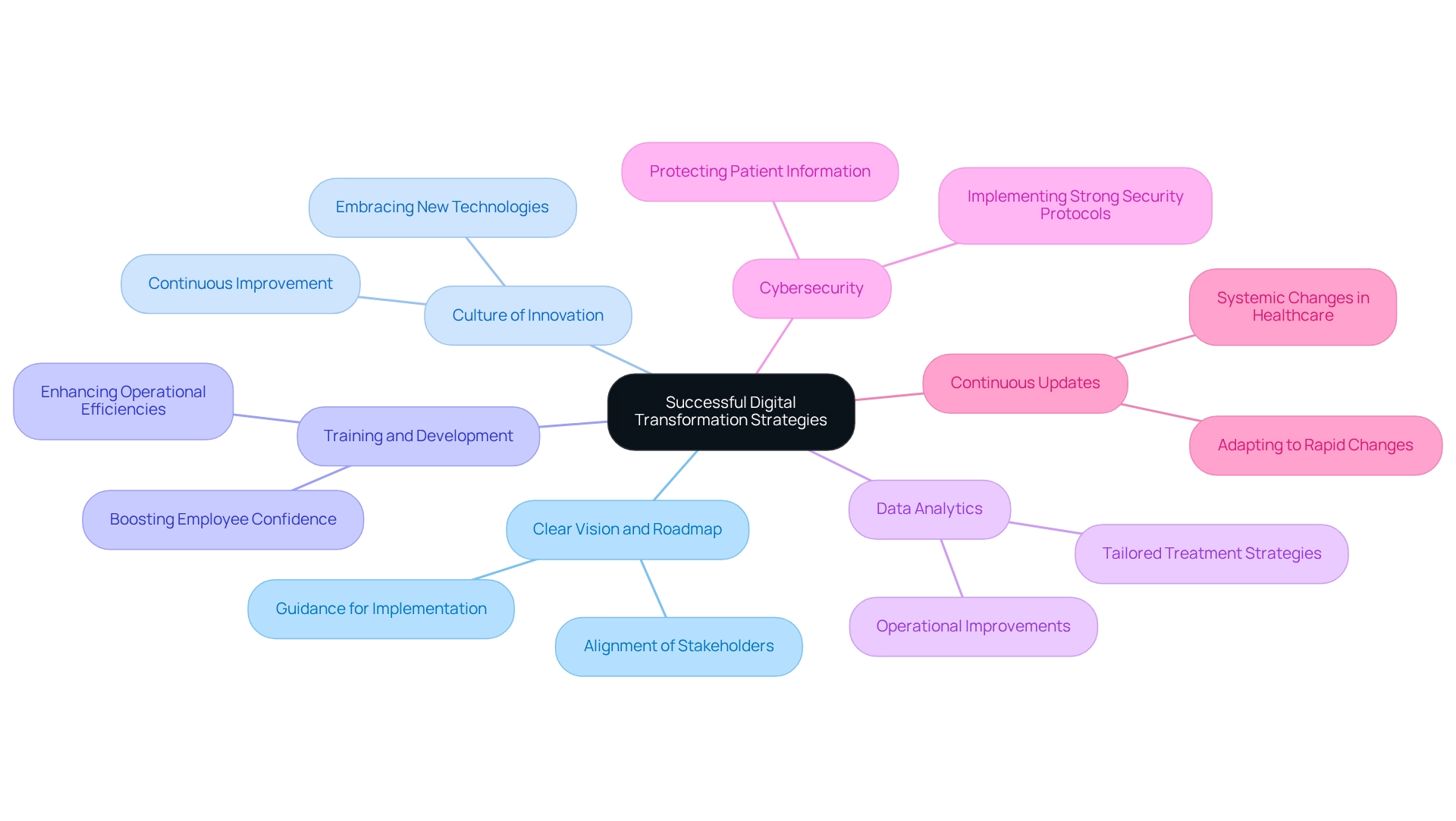
Leveraging Technology for Effective Transformation
Technology is revolutionizing healthcare and digital transformation, fundamentally reshaping how care is delivered and managed. At the forefront of this change are electronic health records (EHRs), which streamline healthcare data management and enhance care coordination. The integration of EHRs significantly improves outcomes; studies indicate that organizations utilizing EHRs report a 20% increase in care efficiency.
Telemedicine platforms have emerged as vital tools, enabling remote consultations that enhance access to care, particularly for individuals in underserved areas. The COVID-19 pandemic expedited the acceptance of telemedicine, with 75% of medical executives recognizing its significance in addressing evolving consumer needs. This shift not only improved access for individuals but also demonstrated telemedicine’s potential to reduce medical expenses by as much as 30% through fewer hospital visits.
However, a notable 75% of executives reported they are not yet able to deliver on their healthcare and digital transformation ambitions, highlighting significant challenges in scaling digital programs. Artificial intelligence (AI) and machine learning are transforming healthcare by analyzing vast amounts of data to identify trends and improve diagnostic accuracy. For instance, AI algorithms can predict a person’s deterioration, enabling timely interventions that can save lives. Additionally, the Internet of Medical Things (IoMT) connects devices and wearables, facilitating real-time monitoring of individual health and enabling proactive care management.
Significantly, advancements in electronic medicine, such as virtual reality (VR) and AI, are personalizing care by offering innovative treatment options that minimize side effects and enhance engagement. The application of VR in addressing PTSD, as illustrated at the Interface Summit, exemplifies how immersive experiences can assist individuals in facing and managing their conditions effectively.
By leveraging these technologies, medical entities can substantially enhance patient involvement and operational efficiencies. A recent survey revealed that 71% of medical students globally believe that healthcare and digital transformation will positively influence the medical field, underscoring the growing consensus on the importance of technology in the sector. As the medical field continues to advance, the integration of these crucial technologies will be essential for entities striving to deliver exceptional care through healthcare and digital transformation while maintaining a competitive edge.
Furthermore, the importance of patient data accessibility cannot be overstated; empowering patients with control over their health data is vital for exploring new treatment options. As Gustavo Estrada observed, Avato streamlines intricate projects and delivers outcomes within expected schedules and financial constraints, establishing itself as an essential ally for medical institutions undergoing this transformation. The impact of COVID-19 on health systems illustrates that those who adapted to technological transformation were able to enhance service delivery and better meet the evolving needs of consumers.
Ensuring Data Privacy and Security During Transformation
In the landscape of healthcare and digital transformation, safeguarding data privacy and security is paramount. To protect sensitive patient information, organizations must implement robust security frameworks that include:
- Encryption
- Access controls
- Regular audits
Compliance with regulations such as HIPAA is not just a requirement; it is a foundational element of any online strategy.
Healthcare providers are urged to establish clear protocols for data handling and breach response to effectively navigate the complexities of regulatory compliance. What measures are you currently taking to secure patient data?
The importance of cultivating a culture of security awareness among staff cannot be overstated, as human error remains a leading cause of data breaches. Respondent 3 noted, “there was a lack of training due to this there is lack of knowledge and consequences of the poor practices in digital data security,” highlighting the urgent need for comprehensive training and awareness programs. Alarmingly, statistics reveal that 21% of medical data breaches arise from technical failures, further underscoring this necessity.
Moreover, organizations should explore innovative solutions that enhance data collaboration while preserving privacy. For instance, Avato’s federated AI platform allows medical organizations to analyze sensitive individual information without transferring it, effectively addressing data silos and ensuring compliance with stringent privacy regulations like HIPAA and GDPR. This approach has proven beneficial, enabling a top-five pharmaceutical firm to connect health information globally, thereby enhancing research capabilities while maintaining compliance.
As medical organizations embark on their healthcare and digital transformation journeys, prioritizing data security not only builds trust with clients and stakeholders but also mitigates the risk of costly breaches. Current industry priorities emphasize transparency and collaboration to keep pace with rapid advancements in artificial intelligence and virtual reality, highlighting the critical need for best practices in data privacy and security. By conducting regular evaluations of security protocols and staying informed about emerging threats, medical providers can navigate the challenges of technological transformation while safeguarding their most valuable asset: trust from individuals and the integrity of their health information.
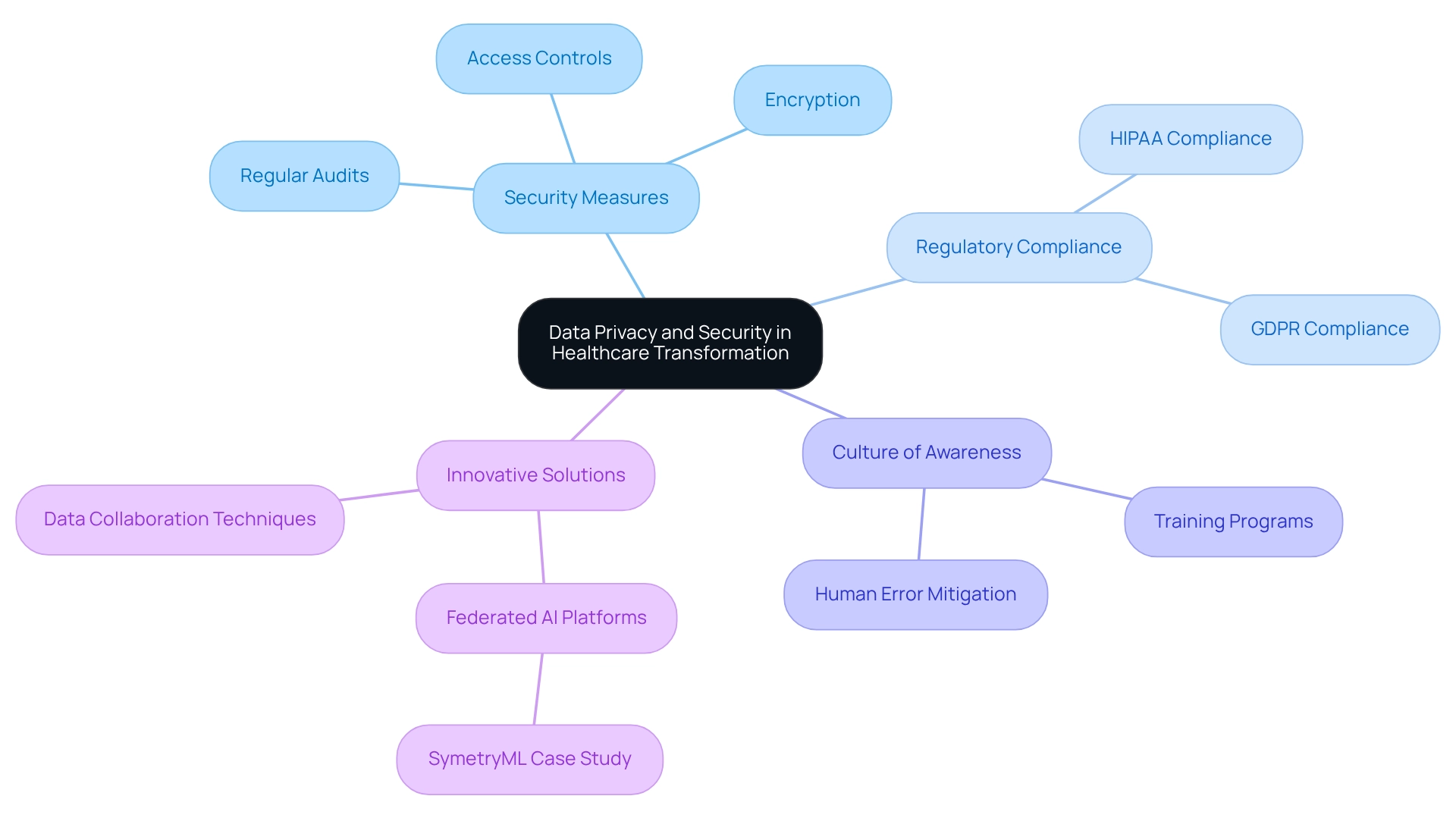
Future Trends in Healthcare Digital Transformation
The future of healthcare and digital transformation in the medical field is poised for remarkable advancements, propelled by several key trends. A significant focus will be on the increasing utilization of artificial intelligence (AI) for predictive analytics, enabling healthcare providers to craft customized treatment plans tailored to individual needs. This transition towards personalized medicine is anticipated to enhance outcomes and satisfaction for patients.
Telehealth is also on the verge of continued growth, spurred by the rising demand for convenient access to care. As medical entities adapt to this trend, they will not only boost patient engagement but also streamline processes, making healthcare services more accessible than ever.
Furthermore, the integration of blockchain technology is expected to play a pivotal role in bolstering data security and interoperability among healthcare systems. This will facilitate seamless information sharing between providers and public health agencies, allowing for more effective addressing of social determinants of health (SDoH). As highlighted by a Senior Vice President of a large faith-based health system, “When you are tracking everything, you are tracking nothing. We aim to mitigate that. Our initial inquiry is, ‘How does this relate to the KPIs we have within the entity?’ The decision is made by the highest level of the establishment.”
The CARES Act’s allocation of $500 million to the CDC for modernizing public health data systems underscores the financial commitment to these technological transformation endeavors.
As organizations embrace healthcare and digital transformation, they will be better equipped to meet the evolving needs of individuals and enhance overall care delivery. Avato’s hybrid integration platform exemplifies how simplifying complex integration projects can bolster operational capabilities, supporting the trends discussed. By unlocking isolated assets and facilitating business value development, Avato stands at the forefront of this ongoing evolution in medical transformation, representing a fundamental shift towards a more efficient, patient-centered approach to care.
Avato’s dedication to designing technology solutions is rooted in its origins as a team of enterprise architects focused on addressing intricate integration challenges, ensuring that providers can effectively leverage AI and blockchain technologies for enhanced patient care.
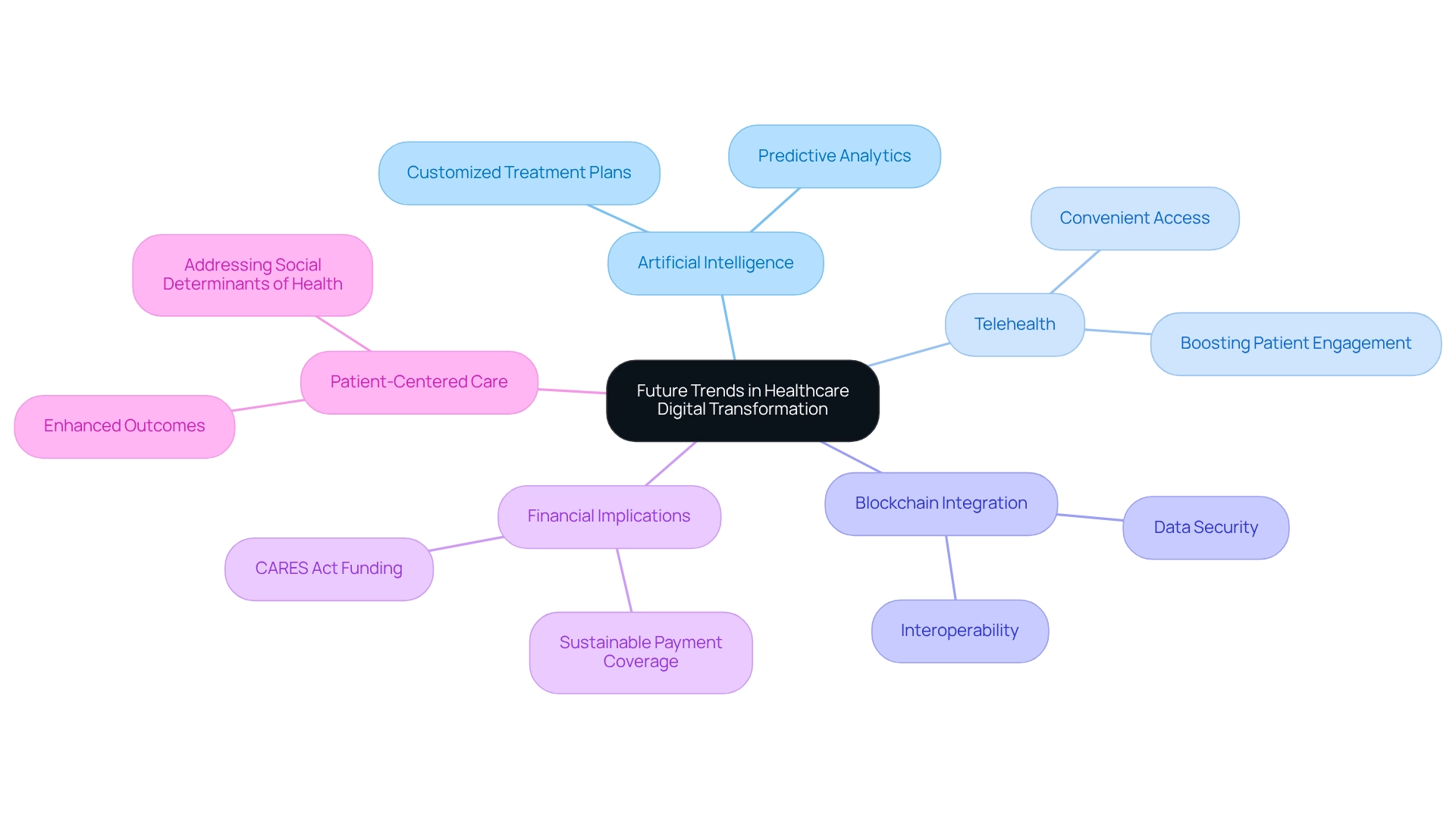
Continuous Improvement and Adaptation in Digital Transformation
Ongoing enhancement is crucial for maintaining technological change in the medical field. Organizations must regularly assess their online initiatives, actively gathering feedback from both employees and clients to identify areas for improvement. The application of agile methods enables iterative enhancements, allowing service providers to swiftly adjust to changing needs and technological advancements.
For instance, electronic health technologies have shown potential in addressing social determinants of health (SDoH) by integrating non-medical elements into health service delivery, thereby enhancing patient involvement. However, challenges such as algorithmic bias and inconsistent application across care settings must be addressed to fully realize these benefits.
Fostering a culture of innovation is equally important, as it encourages teams to experiment with new ideas and solutions. By committing to ongoing enhancement, healthcare organizations can ensure that their efforts in healthcare and digital transformation remain relevant and effective in delivering high-quality care.
This commitment is further supported by the necessity for strong data governance policies and comprehensive training for staff in utilizing electronic health record (EHR) systems, which are essential for maximizing the potential of technological tools. As Gustavo Estrada noted, Avato simplifies complex projects and delivers results within desired time frames and budget constraints, underscoring the importance of continuous improvement in achieving successful digital transformation. The name ‘Avato,’ derived from the Hungarian word for ‘dedication,’ reflects the company’s commitment to architecting the technology foundation required for rich, connected customer experiences.
Avato’s dedicated hybrid integration platform plays a pivotal role in this process, enabling medical entities to unlock isolated assets and enhance business value through secure and efficient system integration. With features such as seamless data integration and real-time analytics, Avato’s platform empowers integration specialists to provide customized solutions that meet the distinct requirements of medical service providers. Ultimately, by embracing continuous improvement and agile methods, medical entities can enhance their operational capabilities and maintain a competitive edge in the realm of healthcare and digital transformation within an increasingly complex environment.
The reliable technology stack provided by platforms like Avato ensures that healthcare and digital transformation organizations can adapt to evolving demands, keeping them competitive in the digital landscape.
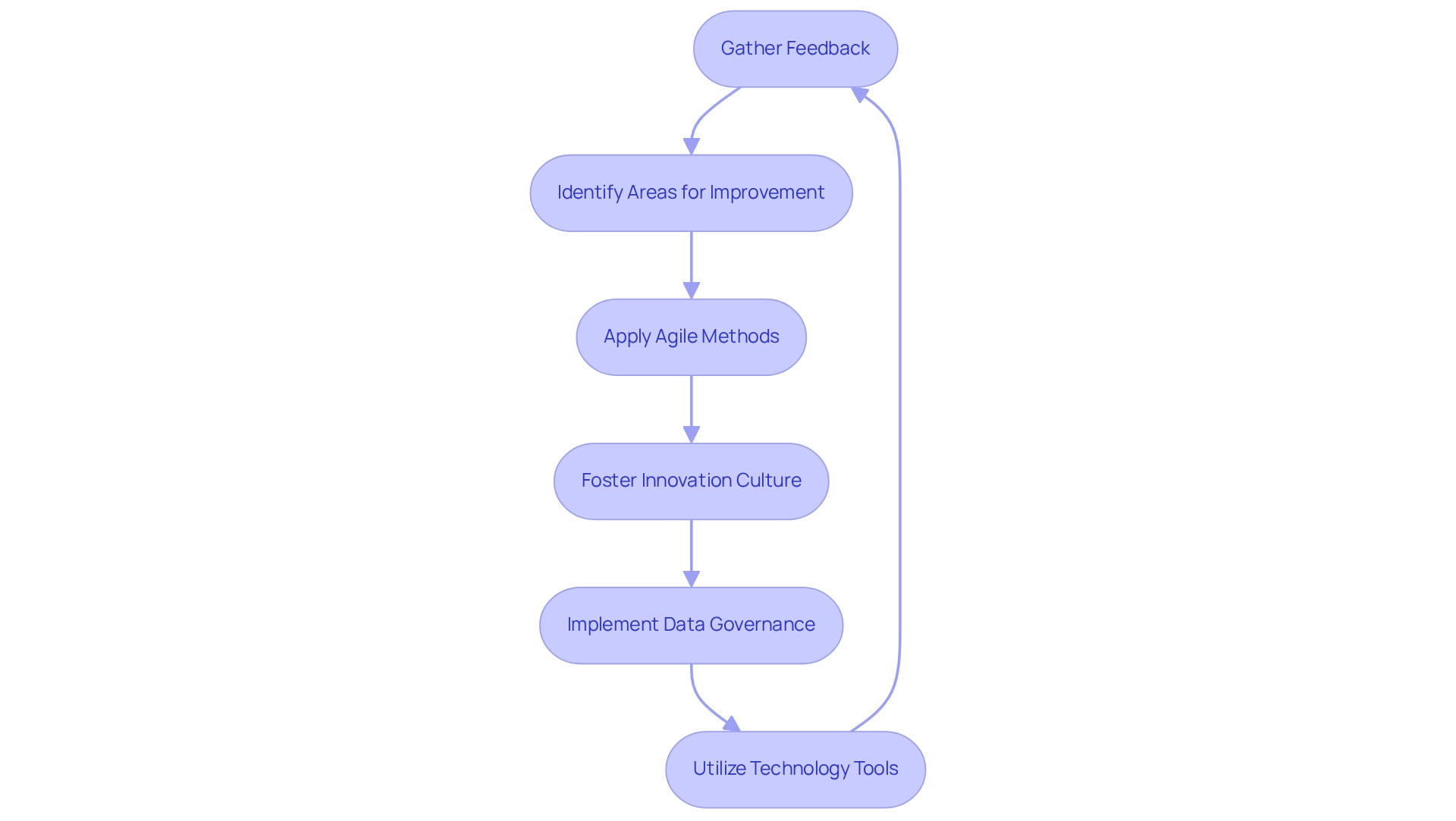
Conclusion
Digital transformation in healthcare is not just beneficial; it is essential for organizations aiming to thrive in an ever-evolving landscape. The integration of technologies such as electronic health records, telemedicine, and artificial intelligence significantly enhances patient care and streamlines operations. Key drivers, including technological advancements, changing patient expectations, and regulatory pressures, necessitate a proactive approach.
However, organizations face substantial challenges, including legacy system integration, data security concerns, and staff resistance to change. Overcoming these obstacles requires comprehensive training, robust cybersecurity measures, and effective change management, which are vital to unlocking the full potential of digital solutions. Moreover, cultivating a culture of innovation and continuous improvement will further enhance service delivery.
Looking ahead, the future of healthcare promises advancements in personalized medicine and the expansion of telehealth services. Organizations that effectively leverage emerging technologies like blockchain and AI will be better positioned to meet patient needs and improve outcomes. Integration solutions, such as Avato’s hybrid platform, will play a crucial role in simplifying complex projects and ensuring adaptability in the digital landscape.
In conclusion, embracing digital transformation is imperative for healthcare organizations. By understanding the drivers, addressing challenges, and implementing effective strategies, providers can successfully navigate this transformative journey and deliver superior care in a complex environment. Are you ready to take the next step in your digital transformation journey?

